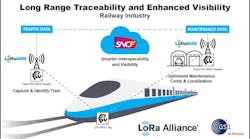LoRa Alliance and GS1 Announce Partnership on Supply-Chain Standards
The LoRa Alliance, the global association of companies backing the open LoRaWAN standard for Internet of Things (IoT) low-power wide-area networks (LPWANs), and GS1 in Europe, a not-for-profit organization that develops and maintains global standards for business communication to improve the efficiency, safety and visibility of the supply chain in a variety of sectors, today announced a formal liaison agreement to explore adding LoRaWAN networks as an available carrier technology to the GS1 standards.
The organizations’ goals are to provide greater efficiency and interoperability for supply chain and maintenance operations, strengthen inventory management, and simplify data exchanges between different systems and stakeholders. The initial collaboration addresses the requirements of the railway industry, with other sectors to follow.
A pilot project is in progress in France for national railway companies to implement a more cost-effective identification system for infrastructure and rollingstock. This initial collaboration is proving the feasibility and value of carrying GS1 identifiers from EPC/RFID tags over LoRaWAN networks. Additionally, an enriched data format is being specified, which can be applied to the railway industry to improve geolocation use cases by networks, as well as access to additional sensing data for predictive maintenance and asset management. End users will have access to easy digitization of existing systems, as well as reduced integration and operational costs resulting from larger adoption of GS1 standards with LoRaWAN.
In the initial pilot program, the focus is on inventory and condition monitoring of railway industry assets. The project objective is to demonstrate that combining RFID and LoRaWAN delivers cost-effective visibility of railway assets, resulting in improved uptime, maintenance and operations. The ambition is to launch other pilots and projects within this cooperation to cover additional sectors and expand to other countries.
